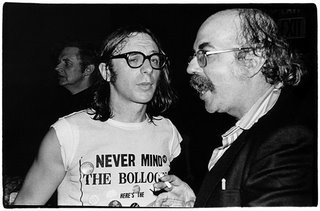Archives
- 01/01/2004 - 02/01/2004
- 02/01/2004 - 03/01/2004
- 03/01/2004 - 04/01/2004
- 04/01/2004 - 05/01/2004
- 05/01/2004 - 06/01/2004
- 06/01/2004 - 07/01/2004
- 07/01/2004 - 08/01/2004
- 08/01/2004 - 09/01/2004
- 09/01/2004 - 10/01/2004
- 10/01/2004 - 11/01/2004
- 11/01/2004 - 12/01/2004
- 12/01/2004 - 01/01/2005
- 01/01/2005 - 02/01/2005
- 02/01/2005 - 03/01/2005
- 03/01/2005 - 04/01/2005
- 04/01/2005 - 05/01/2005
- 05/01/2005 - 06/01/2005
- 06/01/2005 - 07/01/2005
- 07/01/2005 - 08/01/2005
- 08/01/2005 - 09/01/2005
- 09/01/2005 - 10/01/2005
- 10/01/2005 - 11/01/2005
- 11/01/2005 - 12/01/2005
- 12/01/2005 - 01/01/2006
- 01/01/2006 - 02/01/2006
- 02/01/2006 - 03/01/2006
- 03/01/2006 - 04/01/2006
- 04/01/2006 - 05/01/2006
- 05/01/2006 - 06/01/2006
- 06/01/2006 - 07/01/2006
- 07/01/2006 - 08/01/2006
- 08/01/2006 - 09/01/2006
- 09/01/2006 - 10/01/2006
- 10/01/2006 - 11/01/2006
- 11/01/2006 - 12/01/2006
- 12/01/2006 - 01/01/2007
- 01/01/2007 - 02/01/2007
- 02/01/2007 - 03/01/2007
- 03/01/2007 - 04/01/2007
- 04/01/2007 - 05/01/2007
- 05/01/2007 - 06/01/2007
- 06/01/2007 - 07/01/2007
- 07/01/2007 - 08/01/2007
- 08/01/2007 - 09/01/2007
- 09/01/2007 - 10/01/2007
- 10/01/2007 - 11/01/2007
- 11/01/2007 - 12/01/2007
- 12/01/2007 - 01/01/2008
- 01/01/2008 - 02/01/2008
- 02/01/2008 - 03/01/2008
- 03/01/2008 - 04/01/2008
- 04/01/2008 - 05/01/2008
- 05/01/2008 - 06/01/2008
- 06/01/2008 - 07/01/2008
- 07/01/2008 - 08/01/2008
- 08/01/2008 - 09/01/2008
- 09/01/2008 - 10/01/2008
- 11/01/2008 - 12/01/2008
- 01/01/2009 - 02/01/2009
- 04/01/2009 - 05/01/2009
- 07/01/2009 - 08/01/2009
- 09/01/2009 - 10/01/2009
- 10/01/2009 - 11/01/2009
- 11/01/2009 - 12/01/2009
- 12/01/2009 - 01/01/2010
- 03/01/2010 - 04/01/2010
Utopian Turtletop. Monsieur Croche's Bête Noire. Contact: turtletop [at] hotmail [dot] com
Thursday, August 31, 2006
[addendum below, 9:32 pm.]
Via Zoilus, news that the new owners of the “Village Voice” fired Robert Christgau for “taste.”
As Carl says, “wow.”
I don’t know enough to know whether the motivation is,
“we’re doing this because we can and we wanna show who’s the man”,
or,
“we don’t care about his eminence, the additional readership he attracts does not justify his salary.”
Well, I’m going to stop reading it. Not as a protest, but just because he was the main reason I read it.
The “Voice” owned the “Seattle Weekly” too, and now the “Voice”'s new owner does. The “Weekly” has taken a huge hit. Four really distinctive writers quit, they axed the indispensible political endorsements, and worst of all they added a truly ugly syndicated column from So. Cal. called “Ask the Mexican.”
“Let’s insult our readership and McDonald-ize whatever is distinctive about local culture.”
That’s capitalism -- surprise surprise. Capitalism as Loss -- what is gained? I mean besides the centralization of capital.
Same thing happened with our local AM “pre-rock-pop” station. A national chain bought it, replaced all the local DJs with national syndicated shows; and the distinctive local flavor is gone. The songs are pretty much the same, but instead of a bunch of friendly enthusiastic corny male DJs with almost effeminate speech melodies, we got stiff-backed middle-aged waspish-sounding men intoning portentously about “the music of your life,” and no local references. I hardly listen to it any more, but it doesn’t matter, because even if audience share and ad revenue decrease, the decrease in costs no doubt outruns it.
The “Weekly” has gotten a raft of letters complaining about the gross and offensive stereotyping in the new syndicated column. I’m sure the take-over artists in charge count on that. “We’re being provocative.” Ask any boy in 7th grade, it’s the easiest thing in the world to do.
Best wishes in finding new digs, Mr. Christgau.
* * *
Addendum. If had not been on a blogging hiatus when these came out, I probably would have linked to them then: 2 New York music critics in a display of extreme-sport criticism.
Christgau saw 32 shows in 30 days and had sharp things to say about the experience. And Alex Ross of the “New Yorker” topped him by listening to all 180 CDs of the complete Mozart.
Mozart died at age 35. I know he started composing at age 3 or 5 or something; so, think of someone who started at 20 and lived to be 52.
180 CDs?!?!? Almost a CD every two months. For 32 years.
Robert Christgau and Alex Ross both earned gold medals in our imaginary crit-Olympic super-marathon.
Wednesday, August 30, 2006
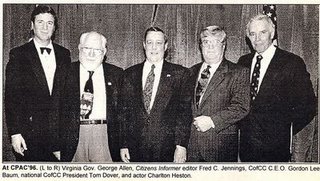 Virginia Republican Senator George Felix “Macaca” Allen has associated himself with the white supremacist group Council of Conservative Citizens.
Virginia Republican Senator George Felix “Macaca” Allen has associated himself with the white supremacist group Council of Conservative Citizens.Why does it not surprise me that he likes country music?
The title song -- the first song -- on Gretchen Wilson’s recent album All Jacked Up is a rippin’ piece of party-hearty Southern Rock. I got it from the library and was digging it. I had liked the title hit from her previous album, “Here for the Party”; never heard that album’s other big hit, “Redneck Woman.” The title song was the only one I’d heard and I’d liked it a lot.
The new one repeats the alternation of everywoman party animality and redneck pride. The second song, California Girls, is a diatribe against coastal California women -- Wilson explicitly exempts women from the interior city Sacramento to an outer L.A. suburb in conservative Riverside County, Corona. The conservative parts of liberal California -- Gretchen approves of them.
Ain't you glad we ain't no California girls
Ain't you glad there's still a few of us left, who know how to rock your world
Ain't afraid to eat fried chicken and dirty dance to Merle
Ain't you glad we ain't no California girls
For years Seattle’s downtown McDonald’s, the one nearest Pike Place Market, played country music on its outdoor speakers to discourage young African American men from loitering. Not all country fans are race bigots, but enough are so that when I’m listening to country radio with the window open, and I drive by a construction site where African American people are working, I turn my radio down. Stupid-ass sectionalist bigotry like this from Gretchen Wilson is one of the reasons why.
I haven’t yet made it past the second song.
Tuesday, August 29, 2006
 Rainstorm tonight. I can't believe summer's almost over. (My beloved spouse took this picture at my folks' place in Michigan about a month ago.)
Rainstorm tonight. I can't believe summer's almost over. (My beloved spouse took this picture at my folks' place in Michigan about a month ago.)New links:
Freshman year in college I played in a synth-pop-noise band called “Bob.” I only played two gigs, and one was all improvised to accompany an evening of ‘30s surrealist films. The other gig was in the dorm basement cafe, a regular set with songs ranging from synth-pop to noise-improv. Stefan Keydel sang strong lead on the pop numbers and played good bass, and he was a real nice guy. Presumably he still is -- we haven’t seen each other in probably 20 years. I recently found out he has a blog, called Plunjerbunni, on politics & culture & daily life.
Turtletop correspondent and ace musician Jay Sherman-Godfrey now has a MySpace page, where he’s put up a couple of his tasty instrumentals, which are quite different from his songs, in addition to some occasional blogging. We met as babies or toddlers -- really (our parents are good friends) -- and had a band together in high school.
I met Jake London, a/k/a Turtletop correspondent J-Lon, the night before first day of classes freshman year in the dorm. His room was next to the Men’s room; the door was open and he was playing guitar. I poked my head in. “Did you play in a band in high school?” “Yeah.” “Me too.” We’ve been pals ever since and on-and-off bandmates. He has MySpace page too, actually two, one for his writing and one for his music.
I have never met, much less played in a band with, the proprietors of Destination: OUT, but anybody’s that’s posting MP3s of music by people such as Art Ensemble of Chicago is going to be on my regular route.
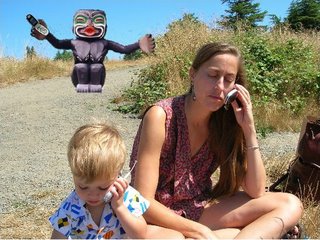
My beloved spouse writes:
August 28, 2006
Nat and I were in the bathroom at the park. I said something to him, and he said, "Huh?" I informed him that that was a rude response. He parried with defensive questioning about why it was rude. "It just is," I said, "and you shouldn't say it." "Dzunukwa says it isn't rude. You should have a discussion with her." "Sure, Nat. You tell her to give me a call and we'll talk about it." Nat is the medium for communication with Dzunukwa. She talks only through him, generally as justification for behavior which he knows perfectly well is bad. We left the park and he fell asleep in the car right away, worn out after a long morning of swimming and playing.
Two and a half hours later he wakes up in his bed, and goes downstairs to where I was napping on the couch. He goes back upstairs and returns, talking into his toy cell phone. He brings it to me and says with complete aplomb, "Here, Dzunukwa wants to talk with you. You can have a discussion. About . . . about what is rude to say." This is the first time I have been allowed to speak with the Wild Woman of the Woods. I play along with it. "Hi, Dzunukwa. How are you? I'm fine, thanks. You let your kids do what? I don't think that's funny at all. I don't care, Nat is not allowed to say that. I tell him what is rude. Okay, nice to talk with you. Bye." I hand the phone back to Nat, and he points out that I hadn't pressed the red button to hang up. He took care of it for me. And then it was time for juice and cookies.
Sunday, August 27, 2006
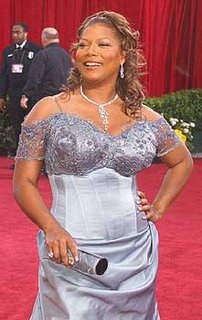
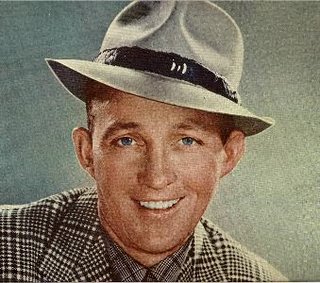 STARS
STARSThe recent discussion between Carl Wilson and Peli Grietzer on Brechtianism in song and the distinction between the “monologue” mode of song, in which the singer represents his or her private feelings on a matter, and the “narrative” or “ballad” mode of song, in which the singer tells a 3rd-person tale, reminded me of old thoughts of mine on music of introspective meditation versus music of the social dancing body, and the related distinction between the “monologue” song and the “soliloquy” song. A Nat King Cole doc on public TV helped me see the distinction: Nat King Cole looking the camera in the eye exemplified the “monologue” approach to singing as opposed to rock’s “soliloquy” approach. In the “monologue” song, the singer represents him- or herself as addressing another person; in the “soliloquy” song, the singer represents him- or herself as musing privately and without audience.
An unexpected recent thought related to this distinction: Hip hop movie stars Queen Latifah, Ice Cube, Will Smith, Ice-T, and Mark Wahlberg are the first musicians to become Movie Stars since Bette Midler. Many rock stars have acted in movies, but none since Elvis, with the possible exceptions of David Bowie and Madonna and Kris Kristofferson, have become stars, and neither Bowie nor Madonna present themselves singing in the “soul-baring soliloquy” rock mode, and Kristofferson is more of a country singer, which is to say, a monologue more than a soliloquy singer. Like country, hip hop is much more of a “monologue” than “soliloquy” style. A rapper, like a pre-rock pop singer and a country singer, looks the audience in the eye. A rapper also has to have an acute sensitivity to a song’s individual words and can’t steamroller over their nuances in the service of an over-riding mood. Rock singers often subsume moment-by-moment verbal-emotional nuance into that over-riding mood; the great pre-rock-style singers didn’t. Acting requires sensitivity to language.
Persona-shifting rock singers like Bowie, Madonna, and Tom Waits undermine the monologue-soliloquy notion -- which rock and pre-rock singers share -- that the singer is speaking of his or her own personal emotions.
In a comment to the above-linked post on his blog, Carl quotes me as having said to him via email that Randy Newman got to some of his Brechtian effects from Mark Twain, but that’s not what I meant to say. Twain’s satirical sting and use of unreliable narrators seem relevant to Newman, but Carl has pointed to more specific parallels between Newman and Brecht that I don’t see in Twain. I’m wary of the adjectivization of complex artists like Brecht; when I think “Brechtian” my first thought is toward the sensual, cold-blooded, misanthropic misogynist that the quasi-autobiographical character Baal represented and that Brecht appears to have been quite like in real life; I also think of the writer of classical epigrams who has been touted by some critics as the closest 20th century poet to the mood of the “Greek Anthology.” But “Brechtian” means neither of those things; it tends to refer to his revival and transformation of Renaissance theatrical techniques that break the flow of the naturalistic narrative by addressing the audience directly. While I feel Carl’s point that Newman’s style has Brechtian elements, I keep wondering whether Newman didn’t get them from Fats Waller and Bob Wills and indirectly from the American minstrel tradition. Except for this: Waller and Wills’s anti-naturalistic asides were the choices of brilliant performers, while Newman, like Brecht, wrote his dialectics into his scripts. But then, a minstrel song like Jimmy Crack Corn would fit right into a Brecht play or a Newman show.
The film critic Jonathan Rosenbaum has written of how movie stars over-ride all contradictions. Bono and Robert Plant over-ride all contradictions too, but it’s hard to imagine them as movie stars; an actor has to contend with the quotidian too, has to be attentive to the everyday flow and burble of life. The verbal acuity of the pre-rock popsters and the rappers equips them for this. But then I think of verbally nuanced rock stars like Lennon and Springsteen, and then I don’t know again. Not knowing is OK.
I agree with Carl that Newman’s thing is to emphasize the contradictions. Not star material -- not “hot” enough.
Monday, August 21, 2006
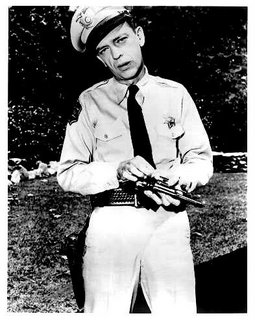 Via dKos, news that the Brits are pissed that the United States blew it big time with the Pakistani bomb plot by jumping the gun.
Via dKos, news that the Brits are pissed that the United States blew it big time with the Pakistani bomb plot by jumping the gun.It might be funny if the United States were Mayberry and Otis the Town Drunk represented the sum of the country's chronic social problems. But who in hell had the idea to nominate Barney Fife for President, and why did five Supreme Court Justices think it was such a hot idea to subvert our democracy as well as their own authority and install him there?
Although, it's true, I would not have minded having a beer with Deputy Fife, the real one. The ludicrous faker in the Oval Office, forget it.
(Memory Lane: Andy used to call Barney, "Barn," sometimes, right? And is my memory hallucinating that Barney used to call Andy, "Ange"?)
Sunday, August 20, 2006
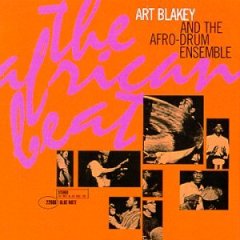
My post last night on the relationship between words & music in song dissatisfied me. Partly it dissatisfied me because the quality of any experience tends to elude language; language can only create a sort of parallel experience, and I lack the chops to pull that off with an experience as whelming, powering, and encompassing as music. The post also seemed to point me toward this idea that music is primarily “about” human emotion, and that’s a limiting notion.
A couple years ago I got into a bitter argument with total strangers on an internet discussion group about whether music exists. Two of them were arguing with me, and dozens of people got the emails but didn’t take part, leaving me to flail at nonsense. I never completely understood what they meant by saying that music doesn’t exist -- and, you should know, the topic of this discussion group was music!
I think the idea that music didn’t exist had something to do with the lack of a definition that was sufficiently broad to account for every possible example of music while being sufficiently narrow to exclude non-musical specimens. For example, if classical and hip hop composition incorporate speech, when is speech not music?
Brothers and sisters, this lack of a comprehensive and exclusive definition for music is a strength.
Music is an experience of sound. Music is a quality of attention that a listener gives to a sonic experience. The listener can also be the producer of the sound, even at the moment as the sound is emerging.
The music maker wants to create a sonic experience worthy of a musical attention, even if the only person who will ever pay attention is the music maker themself. What music does, why we want to give it our attention -- that is the mystery. I like the feelings that music transforms within me.
In comments to the above-linked post on the relationship between music & words, J-Lon talked about the history of the limitation on recording drums, and how the emergence of the possibility of recording Enormous Loud Drums may have been a factor in the down-playing of vocals in popular music recordings. (King Oliver’s drummer Baby Dodds was forbidden from playing drums in the recording studio and had to play woodblocks on records in the early ‘20s -- the recording technology could not handle the drums’ sound.) And that got me thinking of one of my favorite drum albums, Art Blakey’s The African Beat, recorded with a bass player, a reed player, and several African and Caribbean hand drummers. In the midst of all that lovely organicism, human hands beating animal skins stretched resonantly over wooden frames, Blakey’s stick hitting that militaristic snare sounds positively nuts. It’s extremely beautiful, virtuosity in the service of the juice and marrow of life. Worthy of a listen.
* * *
Other music on my mind lately, subjects for future posts:
Caetano Veloso’s A Foreign Sound, which came out last year.
Tanya Tagaq, whose music twice brought me to tears at the Vancouver Folk Music Festival, and whose album Sinaa is astounding.
William Bolcom’s setting of William Blake’s collection of poems, Songs of Innocence and of Experience.
Clarence Williams, 1920s jazz bandleader, pianist, songwriter.
Books, or at least lengthy magazine articles, I wish I knew where to find right now:
A history of the Brazilian Tropicalia movement.
And a history of African American Tin Pan Alley giants such as Clarence Williams, Spencer Williams (no relation), Fats Waller, and Eubie Blake.
Suggestions welcome.
Saturday, August 19, 2006
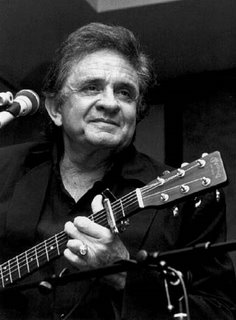 Jody Rosen takes on the Johnny Cash legend, but he doesn’t go as far Paul Hemphill went in his 1969 book The Nashville Sound. Not only has Cash’s rep always been a cornball myth, but he always had intonation problems too.
Jody Rosen takes on the Johnny Cash legend, but he doesn’t go as far Paul Hemphill went in his 1969 book The Nashville Sound. Not only has Cash’s rep always been a cornball myth, but he always had intonation problems too.Let the record be set straight from the beginning: Johnny Cash is not a jailbird, a pillhead, a brawler, a murderer or even a bad boy. In the summer of ‘69, when his popularity had spilled over into the pop- and folk-music audiences, such a legend had grown up around him that it was too late for anybody to deny any of these things. His songs about prison and despair, sung in a flat, slightly off-key voice of doom, Cash wearing all black, Cash with human suffering in his deep eyes and on his tortured face, Cash insolent and lashing out from the stage, Cash in a black swallowtail coat and striped morning pants like an elegant undertaker, Cash swinging his guitar around and pointing it at his listeners as though it were a tommy gun, all of these things captured the whole world and made Johnny Cash of Dyess, Ark., the most charismatic figure in show business. “Johnny Cash?” people in New York were saying when ABC-TV announced “The Johnny Cash Show” as a prime-time summer replacement. “I thought he was dead from pills or something.” The kids on Harvard Square believed without question that Cash had done time at Folsom Prison for crimes ranging up to murder, and that his album recorded live from Folsom was the purest expresion of Artist-Saying-What-He-Knows, and they became irritated when advised it wasn’t necessarilty so. People wanted to believe the legend of Johnny Cash, and when there were no fresh Cash tales to repeat they made up new ones.
Myths die hard, in Rockville as anywhere. And Cash’s myth constitutes a lot of his appeal. None of this detracts from his musical and emotional power at his best. He had a rhythm and a roar that were uniquely his own; his dramatic sense was impeccable; he wrote some great songs and picked other great ones to sing.

My post on bad Beatle lyrics the other night -- I tossed it off and left so much out. Here’s some of what I left out.
The Beatles did not augur an era of bad lyrics so much as they prophesied a de-emphasizing of lyrics in popular music. While lyrics became less important, vocals went lower in the mix. Even as early as the Beatles. Compared to the various forms of hard rock of today, indie and metal especially, the Beatles’ vocals are way up front, center & loud, but people complained about their low-mixed vocals way back in the ‘60s. (At least, Glenn Gould did, and while I may not always agree with his judgments, I trust his ears.)
The de-emphasizing of vocals and lyrics embodied the Romantic rebellion against Reason that happened in ‘60s popular culture and that remains current today. The rebels felt they couldn’t make rational sense of the world and human behavior, and lyrics consequently made less rational sense.
Psycho-acoustically, the de-emphasizing of vocals dramatizes the perception that the world overmatches people, in particular, the industrial world: our machines overmatch us, and the electric and electronic noise of our music overmatches our voices.
Others have pointed out that the post-war generation was the first in human history to grow up without an assurance of a future, in the shadow of the Bomb whose power could end human life (and whose status as a Capitalized Noun understandably connotes its quasi-supernatural diabolical status). Our machines do indeed overmatch us.
So it’s not that Robert Plant wrote bad lyrics -- it’s that the lyrics didn’t much matter any more. Popular music changed. Led Zeppelin rocks and astonishes me, but I still love the old-style well-made song.
In writing, “tone of voice” is the hardest aspect to control, because tone is arrived at partly unconsciously, and because the connotative aspects of language are indeterminate. The associations you bring to any word or phrase will be different than the associations I bring to it.
Any communicative act has a tinge of magic. An idea or emotion travels by my will from me to you. Powerful words can produce physiological changes. If you tell an embarrassing story of my youth in my presence, my skin may turn red. If you insult my family, my heart will beat fast with anger. A sad story can make me cry.
More importantly, the speaking voice conveys all sorts of emotional information that bare words do not, through tone of voice. Think of all the different ways you can say, “Come here, please,” from obsequeous to angry. And the words remain the same.
This is where we start to overlap with music. Music isn’t only about emotional tone, but it conveys enormous waves of information including emotional information. One piece of instrumental music by Duke Ellington can make me cry, another can raise thrills of excitement over my skin, another can fill me with languorous joy.
Words can do these things too.
I love the craft of songwriting, of matching emotional tones of words and music. The match need not be a neat parallel; it frequently is a contrast -- pleading words and confident music, angry words and sweet music, sympathetic words and schadenfreude music -- as many contrasts as you can imagine. The endless subtlety and complexity of life, consciousness, and the unconscious. The horizon that never arrives; the fire that never consumes; the wind and the waves that never rest.
Tonight was the 50-year reunion of my dad’s high school class. My brother -- a professional photographer -- worked it. Tomorrow would have been my parents’ 46th wedding anniversary. Melancholy time. How many times in the past 2 weeks have I thought, “Oh, I’ve got to ask Dad” about some question or “I’ve got to tell Dad” about some story?
The power of song: Last Monday after my first day back at work I was listening to Gordon Lightfoot, “If You Could Read My Mind,” and this vivid memory from the time when it was a hit song overwhelmed me: a drive up to central Michigan to go on a canoe trip, stopping at a rural gas station in hilly country, a thunderstorm coming and the sky turning green. I don’t even know if my dad was there -- the trip might have been with my church youth group -- and I don’t even know if my dad like Gordon Lightfoot, but I burst into sobs. Mourning my childhood.
Tears of self-pity.
And, sometimes when I remember my dad’s last few days, tears of pity.
And, sometimes when I think of all the love my family got from friends, more tears. Scenes of tenderness and love make me cry. When my dad’s brother visited the day before we took Dad to the hospital, as he was leaving, I told my uncle, “I know there’s nobody he wants to see more than you,” and I started crying. Because I knew how much they loved each other.
Last winter, when my son and I went home for what would probably be and what proved to be Dad’s last Christmas, my mom was helping organize the Christmas Eve Children’s pageant at church, and she brought home a sheep’s costume for my son. He wore the sheep-hat all day, but it developed that he had a cold and would be staying home for the evening, and that another boy or girl would have to play the sheep. He was extremely upset to surrender the sheep-hat, putting up an enormous tearful fuss, until we hit upon the solution. My dad would be staying home that night too, as would I, and as Dad had lost his hair from chemotherapy, he had taken to wearing a University of Michigan baseball cap with the bill cut off, a gold and blue skull cap. We found a gold-and-blue Michigan pullover winter hat for my son to wear, and offered it to him “so he could be like Grandpa.” That satisfied him, and he no longer fussed about the loss of the sheep-hat. He wanted to be like Grandpa.
In some basic and significant ways I always wanted to be like him too. Still do.
The power of song: Last Monday after my first day back at work I was listening to Gordon Lightfoot, “If You Could Read My Mind,” and this vivid memory from the time when it was a hit song overwhelmed me: a drive up to central Michigan to go on a canoe trip, stopping at a rural gas station in hilly country, a thunderstorm coming and the sky turning green. I don’t even know if my dad was there -- the trip might have been with my church youth group -- and I don’t even know if my dad like Gordon Lightfoot, but I burst into sobs. Mourning my childhood.
Tears of self-pity.
And, sometimes when I remember my dad’s last few days, tears of pity.
And, sometimes when I think of all the love my family got from friends, more tears. Scenes of tenderness and love make me cry. When my dad’s brother visited the day before we took Dad to the hospital, as he was leaving, I told my uncle, “I know there’s nobody he wants to see more than you,” and I started crying. Because I knew how much they loved each other.
Last winter, when my son and I went home for what would probably be and what proved to be Dad’s last Christmas, my mom was helping organize the Christmas Eve Children’s pageant at church, and she brought home a sheep’s costume for my son. He wore the sheep-hat all day, but it developed that he had a cold and would be staying home for the evening, and that another boy or girl would have to play the sheep. He was extremely upset to surrender the sheep-hat, putting up an enormous tearful fuss, until we hit upon the solution. My dad would be staying home that night too, as would I, and as Dad had lost his hair from chemotherapy, he had taken to wearing a University of Michigan baseball cap with the bill cut off, a gold and blue skull cap. We found a gold-and-blue Michigan pullover winter hat for my son to wear, and offered it to him “so he could be like Grandpa.” That satisfied him, and he no longer fussed about the loss of the sheep-hat. He wanted to be like Grandpa.
In some basic and significant ways I always wanted to be like him too. Still do.
Thursday, August 17, 2006
 I bet Schubert’s lyricists didn’t catch this kind of grief
I bet Schubert’s lyricists didn’t catch this kind of grief*
Interesting discussions over at Carl Wilson’s and Ali Marcus’s blogs on the ideal balance of words & music in the ideal song. I have my views on this, but something that seems clear: some time in the late ‘60s, it became possible to write influential, hugely popular songs with bleeaahh lyrics. Led Zeppelin, baby. Everybody who loves them for their lyrics, please raise your hands. But what a Sound! What riffs, what beats, what timbres!
This dovetails with something I’ve been thinking about for a long time. The Beatles are the patron saints of bad lyric writing. Not that they were bad lyric writers, but that they wrote an awful lot of bad lyrics, especially early on -- as far as I can tell, they pretty much invented the “lyrics shmyrics” attitude toward popular-style songwriting. Nobody before them wrote so many songs with words so obviously thrown together so indifferently.
Ask me why.
No, that’s not a request, that’s the name of Exhibit A.
I love you, 'cause you tell me things I want to know.Ahhhh, it doesn’t really make sense. And on the page, you miss all the pre-written melisma, which only makes it harder to parse.
And it's true that it really only goes to show,
That I know,
That I, I, I, I should never, never, never be blue.
I love you-woo-woo-woo-woo
Cuz you tell me things I want to know
And it’s true-woo-woo-woo-woo
Examples abound.
Whoa, woah, I never realized what a kiss could be
This could only happen to me;
Can't you see, can't you see?
That when I tell you that I love you, oh,
You're gonna say you love me too, hoo, hoo, hoo, hoo, oh . . .
Really now, can’t you see?
Or:
I, thought that you would realize
That if I ran away from you
Then you would want me to
But I got a big surprise Oh-h Oh-h
I can’t understand . . . why didn’t you realize it?
And the bad lyrics don’t ever completely go away. Take a really sweet, touching, interesting song like Hey Jude, and tell me, what in Orpheus’ name does this mean?
So let it out and let it in, hey, Jude, begin
You're waiting for someone to perform with
And don't you know that it's just you, hey, Jude,
You'll do, the movement you need is on your shoulder
Until the Beatles, these sorts of blandly nonsensical lyrics just didn’t make it onto records. Maybe I’m forgetting something, and if so, please let me know, but, much as I love the Beatles, I really think they have Robert Plant and Bernie Taupin and Prince and hosts of other multi-million-dollar bad lyricists to answer for.
Monday, August 14, 2006
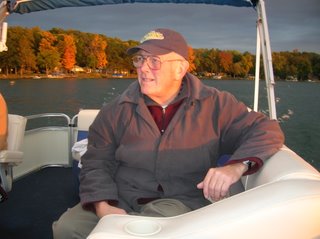 DAD
DADHe was always happy to see you. A warm, genuine person. Not only loving toward his family, but, when we were growing up, all of our friends too. In the days before and after his death we all had friends tell us that he was more “there” for them than their own fathers. This didn’t surprise me.
*
In high school he hated my rock band. Hated the music. He loved swing, a few Michigan songs, maybe a few church hymns, and bawdy songs. He liked Spike Jones.
But he seriously gave me the impression that he was happy for me that I was rockin’ with my buds. Like, he was proud of me, even. That I was doing something to make myself happy, that I was doing something.
When my brother hosted a reunion party for my high school band 5 or 6 years ago, we convened from the west coast and the east coast, rehearsed that afternoon, and played a set, to dozens of our friends and family members. Dad got tipsy and made a rambling sentimental speech after our set. He still hated the music. But he was happy.
*
An excellent sailor. He raced the Chicago-to-Mackinaw race twice, crewing for a friend. He taught me to sail. We raced together for several years. Once during a thunderstorm we had to throw anchor at the nearest shore and swim in. He happened to know the people at whose house we came ashore. I was 11 or 12. They gave us hot chocolate and cookies.
*
Sledding.
*
He loved to hunt, and, when he was younger, fish. I regret not having hunted and fished with him more. I only hunted with him once. We didn’t get anything.
*
When, in the ‘70s, soccer started sweeping the country, my sister’s early-elementary-age team needed a coach. He knew nothing about soccer but when nobody else volunteered he became the coach, wearing a goofy red conductor’s-style cap with big white polka dots to all the games. He yelled at all the kids out of enthusiasm, not in an intimidating way but excited, and he hugged all the boys and girls too.
*
Whenever anybody was in the hospital he went every day.
*
He was old school in a lot of ways. He grew up in the funeral business, helping his dad from teen-age years. His brother inherited the business, and then his nephew when his brother died 5 and a half years ago. My cousin handled the funeral, and the minister was a lifelong friend of the family’s, the minister of my parents’ church. Dad wanted his body in the church for the service, and he wanted my mom’s cousin’s husband with the big beautiful baritone voice to sing “Taps” as he got carried out. It tore me to shreds. Dad, where had you been hiding your magnificent theatrical sense all these years? But this wasn’t cathartic; the emotions weren’t purged. This was real. Still, I’m glad we did it his way.
*
My brother and sister and I all spoke at the funeral, and we all choked up.
*
About 300 people came, either to the viewing the night before, or to the funeral, or both. I saw friends I hadn’t seen in years. It was nice. And emotionally draining. Lots of laughs though too. An old friend told me that when his mother died (I loved her when we were kids), they found an old Army uniform. She had been a WAVE in WW2. She had gotten commendations and awards, and she had never told her kids. She wasn’t ashamed, but she was so anti-war that she didn’t want her kids to know. The only big revelation we’ve found so far about Dad was a picture of him in a bubble bath. The bubbles completely covered him up to his neck, so we put it on a picture board for the viewing.
*
Between church and sailing and hunting, he had a lot of contacts. Plus a lot of our childhood friends came to the events. And a number of his.
*
His impish sense of humor. Coming on nine years ago, when my beloved spouse and I had not been dating very long and before she had met anybody in my family, we were Christmas shopping together and she suggested I buy a magnetic gold-stud earring for my dad. I hesitated but went for it. Christmas morning, Dad opened the little box and chuckled to himself, as if he knew what he would do with it. Christmas dinner was always with his extended family.
That afternoon we got to Dad’s brother’s house and my cousins were in the driveway, welcoming people. Dad took out his earring, said to my cousins, “I’m going to freak your old man out,” and put it on his earlobe. A moment later my uncle came out with his warm and happy Merry Christmases for us all, shaking our hands, until he gets to Dad, “Merry Christmas, Mike,” and then he sees the earring, turns ashen, and without a word spins around and walks back into the house. He and my dad’s uncle didn’t talk to my dad for a couple of hours, until someone let them in on the joke. My cousins laughed hard.
*
Laughter and tears preparing for the funeral. I miss him, and I will continue to miss him.
Friday, August 04, 2006
My dad died this afternoon. My mom and my sister were with him. My brother spent the night with him last night. His beloved brother and uncle and aunt and widowed sister-in-law and only niece and three good friends all visited him the day he died, as did two of his grandchildren, and his third grandchild saw him three days earlier. As of Wednesday he could still express joy in his life. I'm glad he did not linger long in a gone state. I'm sorry I wasn't with him at the end, and I'm glad I was able to be with him as much as I was.
He would have turned 68 next month. I have very much appreciated people's kind words and thoughts. I'll miss him, but he had a good run and saw his children grown and got to know some grandchildren and was surrounded by family and friends at the end. Right now I'm a little dazed, even though I've expected the news and am relieved he didn't suffer greatly long. The new status quo will take some getting used to. Many tears these last months, especially this last week or so, and no doubt more to come. My only deep regret is that my son won't get to know him as a man. But as my dad said the other day when I told him I'll miss him like crazy, that's the way it goes.
This blog will be closed for at least a week. Take care of yourself, OK?
He would have turned 68 next month. I have very much appreciated people's kind words and thoughts. I'll miss him, but he had a good run and saw his children grown and got to know some grandchildren and was surrounded by family and friends at the end. Right now I'm a little dazed, even though I've expected the news and am relieved he didn't suffer greatly long. The new status quo will take some getting used to. Many tears these last months, especially this last week or so, and no doubt more to come. My only deep regret is that my son won't get to know him as a man. But as my dad said the other day when I told him I'll miss him like crazy, that's the way it goes.
This blog will be closed for at least a week. Take care of yourself, OK?

Death is not a metaphor.
"The moment we are born we begin dying."
No.
"Those not busy being born are busy dying."
No.
Self-pitying twaddle.
I got back to Seattle yesterday afternoon after helping to care for my dad for six days and watching him decline unto death, meaning, step-by-step lose more and more of his faculties and control as the disease took over more and more of his body. Death is taboo like sex is taboo in part because both include the loss of physical dignity, and in our culture, we keep these things private.
Dad wanted to go to end-of-life palliative care at the VA on Monday, but they didn't have a bed until Wednesday, so I stayed until Wednesday to help out. When I left he was still talking and somewhat lucid, but he stopped talking yesterday and he's much worse today. As of a conversation with my sister an hour ago he's still alive, but he could go any time now. At the time I left, we didn't -- still don't -- know how many days -- or hours -- he'll hang on.
The reaper is grim.
When I got there Friday he was perfectly alert and still into the Tigers, watching the ballgames on TV, falling asleep and wanting to know what happened. By Sunday he'd lost interest. He was still making jokes on Monday or Tuesday (don't remember exactly, kind of a blur). My dad has always had big prominent jug ears. On Monday or Tuesday he was dozing in a chair and my brother was rubbing his neck. My brother said, "Can you get surgery to pull these things back?" My dad woke up, lifted his head and said, "I want surgery to push 'em out further."
"Well, you could hear better that way."
"That's not the only reason."
When we were there in June, Dad was still up and around. On the 2nd of July he took his last walk away from home, five doors down the lane to an Independence Day party. My friend Jay was at that party and took the picture above of the open lawns of people's front yards where my parents live, where I spent summers growing up, one big open front yard for a mile.
We'll go back for the funeral.
